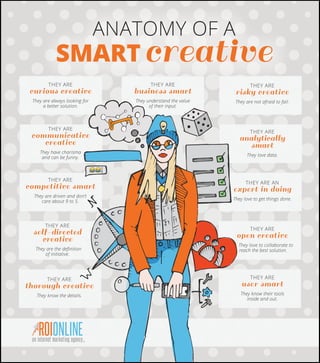The Anatomy Of A Smart Creative
Smart creatives are not confined to specific tasks. They are not limited in their access to a company’s information and computing power. They are not averse to taking risks, nor are they punished or held back when those risks and initiatives fail. They are not restrained by role definitions or organizational structures. In fact, they are encouraged to exercise their own ideas. They don't keep quiet when they disagree with something. They get bored easily and frequently shift jobs. They are multidimensional, usually combining technical depth with business savvy and creative flair. In other words, smart creatives are not knowledge workers. They are a new kind of animal and they are the key to achieving success in the internet century. Since the industrial revolution, operating processes have been biased toward lowering risk and avoiding mistakes. These processes, and the overall management approach from which they were derived, result in environments that stifle smart creatives. Now, however, the defining characteristic of today's successful companies is the ability to continually deliver great products. And the only way to do that is to attract smart creatives and build an environment where they can succeed at scale. And who, exactly, is a smart creative? A smart creative has deep technical knowledge in how to use the tools of her trade, and plenty of hands-on experience. She may be a doctor, designer, scientist, filmmaker, engineer, chef, or mathematician. She is an expert in doing. She doesn't just design concepts; she builds prototypes.

Recomendados
Recomendados
Mais conteúdo relacionado
Último
Último (20)
Destaque
Destaque (20)
The Anatomy Of A Smart Creative
- 1. THEY ARE AN expert in doing They love to get things done. THEY ARE analytically smart They love data. THEY ARE risky creative They are not afraid to fail. THEY ARE open creative They love to collaborate to reach the best solution. THEY ARE user smart They know their tools inside and out. THEY ARE competitive smart They are driven and don’t care about 9 to 5. THEY ARE communicative creative They have charisma and can be funny. THEY ARE curious creative They are always looking for a better solution. THEY ARE self-directed creative They are the definition of initiative. THEY ARE thorough creative They know the details. THEY ARE business smart They understand the value of their input.
